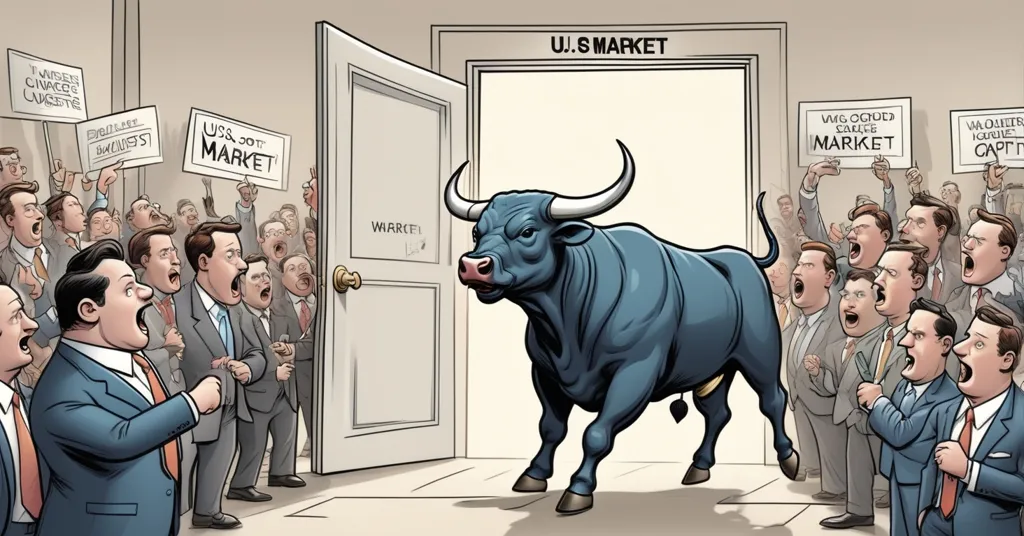Coinlist Reenters U.S. Market Amid Crypto-Friendly Policies, Faces VC Tensions

Coinlist Reenters U.S. Market Amid Crypto-Friendly Policies, Sparks Tension with VCs
Coinlist, a leading token launch platform, has resumed operations in the U.S. after a five-year hiatus, driven by a more welcoming regulatory environment under the Trump administration. This move marks a significant shift in the crypto landscape, as Coinlist gears up for its first token sale for U.S. accredited investors since 2019.
- Coinlist resumes U.S. operations after 2019.
- First token sale for U.S. investors since 2019.
- Trump administration’s crypto-friendly policies.
- SEC drops lawsuits against major crypto entities.
- Community fundraising platforms face VC resistance.
Coinlist’s Return to the U.S. Market
Coinlist’s return to the U.S. is a bold move, signaling a new chapter in American crypto history. The platform’s official X page declared,
“After a difficult chapter in American crypto history, we’re reopening token sales for U.S. accredited investors. Because when America builds, the entire crypto ecosystem moves forward.”
This statement reflects the optimism surrounding the U.S. crypto market’s potential to drive global innovation. Accredited investors, those meeting specific financial criteria, can now participate in token sales, a process that was previously off-limits due to regulatory constraints.
The Impact of Crypto-Friendly Policies
The Trump administration’s approach to crypto regulation has been a game-changer. With the appointment of David Sacks as the AI and crypto czar, and the replacement of Gary Gensler with Mark Uyeda at the SEC, the regulatory environment has shifted dramatically. David Sacks, a prominent tech entrepreneur, brings a fresh perspective to the role, while Mark Uyeda, a former SEC commissioner, is known for his more lenient stance on crypto. Scott Keto, Coinlist’s president, noted,
“The perceived risk of enforcement and its associated costs radically increased during the Biden administration.”
The SEC’s decision to drop lawsuits against Coinbase, Kraken, and Ripple under Trump’s leadership has paved the way for platforms like Coinlist to re-enter the market. This shift has not only reduced the regulatory burden but also opened up new opportunities for U.S. investors.
Community Fundraising vs. Venture Capitalists
However, Coinlist’s return is not without its challenges. The resurgence of community fundraising platforms like Echo and Legion has sparked tensions with venture capitalists (VCs). These platforms, which offer discounted token sales to the community, are facing pushback from VCs who prefer traditional investment models. Jordan Fish (Cobie), founder of Echo, expressed frustration,
“The general thing we see is that Echo secures some allocation in some round, and then we get ghosted, and then the same project says their VC recommended 3-5x higher valuation for Echo. Then we typically just tell them to f**k off.”
This dynamic highlights the ongoing struggle between the decentralized ethos of crypto fundraising and the established practices of venture capital. Echo, founded by Fish, aims to democratize early-stage investment by offering collective investments under uniform conditions, challenging the traditional VC model.
Despite VC resistance, community fundraising platforms are proving their worth. MegaLabs, for instance, raised $10 million in just 3 minutes on Echo, showcasing the power of community-driven launches. Shuyao Kong, co-founder of MegaLabs, confirmed the pressure from VCs, stating,
“VCs are pushing back against discounted valuations.”
This success story underscores the potential of platforms like Echo and Legion to democratize early-stage investment in the crypto space. MegaLabs’ project, MegaETH, a layer 2 blockchain, addresses Ethereum’s scalability issues with real-time blockchain technology, capable of over 100,000 transactions per second and low latency.
Market Growth and Future Projects
The crypto market, excluding Bitcoin, has seen remarkable growth from $60 billion in 2020 to $1.15 trillion in 2024, driven in part by the innovative projects launched on these platforms. The upcoming token sale for DoubleZero, a project focused on building a global fiber network for high-performance distributed systems and blockchains, is a testament to this growth. DoubleZero’s sale, targeting validators across multiple blockchains including Solana, Sui, Aptos, Avalanche, and Celestia, is a clear indicator of the market’s expanding horizons. Austin Federa, co-founder of DoubleZero, emphasizes the importance of open access and innovation in crypto, aligning with the platform’s mission to foster a more inclusive ecosystem.
Balancing Decentralization and Traditional Investment
Yet, the tension between community fundraising and traditional VC models raises important questions about the future of crypto investment. Matt O’Connor, co-founder of Legion, pointed out the irony in VC attitudes,
“To me, the vesting part is particularly ironic because if the team airdrops tokens as unlocked, VCs don’t complain, but when teams sell a smaller portion unlocked, it’s somehow a problem.”
This critique highlights the need for a more balanced approach to fundraising that respects the decentralized nature of crypto while acknowledging the role of traditional investment. Legion, incubated by Delphi Labs, offers a platform for ICOs, aiming to bridge the gap between community and traditional investment models.
U.S. Government’s Strategic Approach
The U.S. government’s strategic approach to digital assets, including the establishment of a Strategic Bitcoin Reserve and U.S. Digital Asset Stockpile, further underscores the shifting landscape. These initiatives signal a recognition of digital assets as a critical component of the financial ecosystem, aligning with the broader trend of regulatory clarity and market growth. The Strategic Bitcoin Reserve aims to treat bitcoin as a reserve asset, while the U.S. Digital Asset Stockpile will manage other digital assets obtained through forfeiture, indicating a more proactive stance on digital currencies.
Legislative Changes on the Horizon
As the U.S. moves closer to passing a stablecoin bill and a new version of the market infrastructure bill, the future looks promising for crypto investors and founders alike. These legislative changes are expected to bring much-needed clarity and open up new opportunities for U.S. participation in the global crypto market. The stablecoin bill aims to regulate the issuance and use of stablecoins, while the market infrastructure bill seeks to enhance the regulatory framework for digital assets, potentially paving the way for more innovation and investment.
Challenges and Opportunities Ahead
While Coinlist’s return is a cause for celebration, it also serves as a reminder of the challenges and opportunities that lie ahead. The crypto community must navigate the tension between traditional investment models and the decentralized ethos that has driven the industry’s growth. As we move forward, the balance between these forces will shape the future of crypto fundraising and investment. The success of projects like MegaETH and DoubleZero, supported by community fundraising platforms, demonstrates the potential for innovation and growth in the crypto space, even as VCs continue to exert influence.
Key Takeaways and Questions
- What prompted Coinlist to resume operations in the U.S.?
The Trump administration’s more crypto-friendly policies and changes in SEC leadership.
- How has the regulatory environment for crypto changed under the Trump administration?
The SEC has dropped multiple lawsuits against major crypto entities, and new leadership has been appointed, fostering a more favorable climate.
- What challenges do community fundraising platforms like Echo and Legion face?
Resistance from venture capitalists who pressure projects to avoid discounted community sales and public offerings.
- What impact has the regulatory climate had on U.S. investors in the crypto market?
U.S. investors were largely sidelined from early-stage participation in the crypto market between 2020 and 2024 due to a stifling regulatory environment.
- What future legislative changes are expected to affect the crypto industry?
The U.S. is close to passing a stablecoin bill and a new version of the market infrastructure bill, which will bring regulatory clarity and potentially open markets to U.S. founders and investors.



